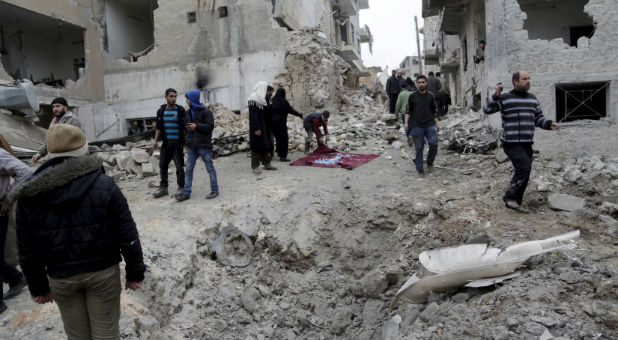What Christians Endure Under Islamic Terror
‘Western’ haircut causes problems
There were moments when John was really afraid. An IS soldier once stopped him in the street and started shouting: “Why are you cutting your hair like this?” John showed him the paper declaring he was a Christian and that he had paid the tax, and the soldier left.
Another day, he was forced onto a bus because an IS soldier didn’t like the jeans he was wearing or his haircut.
“We drove to an underground space where there were hundreds of other men. We were all divided up –first the elderly men were separated from the younger ones, then they separated young men with skinny jeans from the others. Then they separated a group based on their haircuts. I was in that group.”
After the group had been reorganized, a Tunisian IS fighter made a passionate address to the men.
“He said: ‘You are the new generation of Islamic youth. You look like Westerners and it appears you like them and their style, but they don’t like you. People in the West hate you. Westerners are always working to get you away from Islam.’
“The ones with the skinny jeans then had to sign a document promising not to wear them anymore. Then our hair was completely shaved off and we were told to not sport this Western hairstyle anymore. I tried to explain that I was a Christian, but they didn’t pay attention to that.”
The changes in Raqqa were more radical for the women. All women, Muslim or not, have to cover themselves completely when they leave the house.
“It was hard for my mother and sister. They had to buy these clothes, which, of course, we didn’t have at home,” John said.
IS forbade advertising images that showed women not fully covered. Shampoo bottles, for example, which had images of women printed on them, had to be out of sight or removed completely. Regular checks were made.
“I remember a funny incident. A shopkeeper had a red balloon in the shape of a heart in his window. IS came in, screaming that this was a sin. The shopkeeper said it was just a balloon. The IS man insisted that this was sin because the shape could also be seen as a woman’s breasts. The shopkeeper had to pop the balloon.”
John learned how to respond to IS.
“One day an IS man heard my name mentioned and immediately understood that I was a Christian. I saw the expression on his face change. ‘Are you an unbeliever?’ he asked me. I replied: ‘Don’t you know this verse from the Koran that anyone who believes in God, in angels, in the books and in his prophets, in good and bad and in eternal life, is a believer?’ He was shocked that I knew this verse from the Koran and he walked away.”
Fleeing Raqqa in the middle of the night
It was because John couldn’t continue his studies in Raqqa that he eventually left the city. As far as he knows, there are no other young Christians left.
“Of course it feels better. I might not have water and electricity every day as I did in Raqqa, but I feel safer; inside I have peace. In Raqqa there was this constant fear and alertness. Where I am living now, I don’t have to be afraid of the people I meet in the streets.”
John and a few others fled the city in secrecy.
“People could leave the city if it was justified. They could leave for medical treatment that wasn’t available in Raqqa. I even heard of Christians who were allowed to go to another city to celebrate Christmas and New Year. I didn’t have a reason, so I had to leave illegally.”
He left Raqqa on a small bus with 15 others.
“I was so afraid that we would be stopped at an IS checkpoint. But that didn’t happen. We took small roads, avoiding all the known checkpoints.
“After four hours, we arrived at a Syrian Army checkpoint. They welcomed us and then asked why we were so pale. We really had been very anxious. They checked our IDs, and gave us yoghurt. It was delicious.”
John remains in contact with people who stayed in Raqqa. It isn’t easy, but “there are ways”, he said.
Asked about the attraction of joining Islamic State, John said he thinks many IS fighters were attracted by the high salaries paid at the beginning.
“I heard of 1,200 US dollars for a foreign fighter. If they had one or more wives, they would get 100 dollars per wife and 50 dollars per child. I saw them in shops with a lot of money, too much to spend.
“I think they are cheated. They really believe that what they do is right. They feel happy every time they kill someone. You can see this by how they go about executing people—every week finding a new way, even crucifying them. Thank God no Christians were executed for just being a Christian, but because they fought against the IS army.”
Living under the Islamic State for 18 months didn’t help John to understand why they needed to establish themselves in a new territory.
“They were already living in an Islamic country; in Syria the majority are Sunnis. They had their land but if they wanted to live under strict Islam they could have moved to Saudi Arabia.”
John said he is willing to serve in the Syrian Army after finishing his studies.
“I don’t want to run away. We have the right to take back our land. This is my country, not theirs. I am willing to fight for that.”




























































